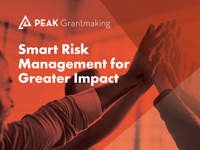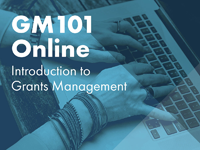Catalog Advanced Search
2 Results
-
Contains 7 Component(s)
Smart Risk Management for Greater Impact will help you understand and manage risk in your organization. The course is designed for grants management professionals who want to increase their organization’s appetite for risk, as well as examine how their organization’s risk profile is limiting the impact of their grantmaking. Individuals who are looking to expand their strategy-related knowledge and responsibilities will also benefit from this course. Supported by resources from PEAK Grantmaking and Open Road Alliance, the learning experience was created with input from subject matter experts. Smart Risk Management for Greater Impact features self-paced interactive learning, narration, and real-world scenarios that reinforce concepts and provide context during the learning experience.

Smart Risk Management for Greater Impact will help you understand and manage risk in your organization.
As many funding organizations begin to re-examine their risk tolerance in light of the pandemic and the global uprising for racial justice, PEAK Grantmaking offers this self-paced online course to help grants managers expand their knowledge about risk, as they implement more flexible and streamlined grantmaking practices.
Supported by resources from PEAK Grantmaking and Open Road Alliance, and created with input from our members, this course will help you better understand and manage risk throughout the grantmaking lifecycle, and help you answer these questions:
- How can we streamline our processes while being thoughtful about potential risks?
- How do our values show up in our policies and practices related to risk?
- How does a low tolerance for risk feed into practices that support bias in the grantmaking process?
- How can we have better conversations with our grantees about potential risks and mitigation or contingency plans?
This course features self-paced interactive learning, narration, and real-world scenarios that reinforce concepts and provide context during the learning experience. Resources and take-away samples will support your continuing work after you complete the course.
Smart Risk Management for Greater Impact is comprised of four modules:
- Module 1: Evaluate Your Organization’s Risk Tolerance
- Module 2: Remove Barriers—Application Process and Requirements
- Module 3: Manage Risk After Awarding a Grant
- Module 4: Review and Action Plan
After completing the course, you will be able to:
- Examine your organization’s values, policies and practices, and grantee requirements through a risk management lens
- Consider how to develop higher risk tolerance by shifting from a focus on compliance to a more holistic examination of the organization’s appetite for risk
- Understand how low risk tolerance can promote bias in the grants management process and reduce impact
- Develop risk mitigation and contingency planning strategies
- Partner with grantees throughout the grantmaking lifecycle to assess risk pre-grant, monitor risk, and modify the grant if necessary
We estimate this course will take about 90 minutes to complete. You may start and stop the course at any time and go back to review sections.
-
Register
- Non-member - $185
- Individual Member - $95
- Organization Member - Free!
- Consultant (Sole) - Free!
- Consultant (Firm) - Free!
- More Information
-
Contains 4 Component(s)
This GM101 online course provides a basic overview of the grants management role, and the scope of the grantmaking process, in funder organizations. The course is designed for professionals who are new to grants management. This includes professionals with backgrounds in accounting, technology systems, program management, and other relevant areas. Grants management is often the department where program, finance, communications, application, approval, and administrative functions overlap. Grants managers perform a diverse set of tasks and maintain a wide range of professional relationships to ensure high-quality grants administration across programs. This course builds a basic understanding of the grants manager’s role, the grantmaking process, and the philanthropic context in which grantmaking takes place.

This GM101 online course provides a basic overview of the grants management role, and the scope of the grantmaking process, in funder organizations.
The course is designed for professionals who are new to grants management. This includes professionals with backgrounds in accounting, technology systems, program management, and other relevant areas.
Grants management is often the department where program, finance, communications, application, approval, and administrative functions overlap. Grants managers perform a diverse set of tasks and maintain a wide range of professional relationships to ensure high-quality grants administration across programs. This course builds a basic understanding of the grants manager’s role, the grantmaking process, and the philanthropic context in which grantmaking takes place.
GM101 Online is self-paced, and can be completed over multiple sessions. The course includes narration of select content by grantmaking experts, an extensive array of resources, learner activities, and a certificate of completion to add to your professional development portfolio. Members will receive a badge for their CONNECT profile.
Course time commitment: 3 to 4 hours
Learn more about the course features and tech requirements
____________________________________________________________________________________________
GM101 Online features five learning modules:
- Module 1: An Overview of Grants Management
- Module 2: Nonprofit Organizations
- Module 3: The Grantmaking Process
- Module 4: View from the Field
- Module 5: Courage in Practice: Principles for Peak Grantmaking
After completing the course, learners will be able to:
- Explain the philanthropic context in which grantmaking takes place, including types of grantmakers and grantees
- Describe and apply best practices for grants management
- Articulate grantmaking’s legal and regulatory landscape
- Assess the health and financial sustainability of prospective grantees
- Employ internal administrative and tracking processes that support a grantmaking cycle
- Promote grants management as a profession
- Identify the Principles for Peak Grantmaking and gain access to tools to help you bring these strategies to action
Grants Management Professional Competency Model
Cross-Cutting Competencies
- Communications: Listen to others and communicate effectively.
- Diversity, Equity, and Inclusion: Promote diversity, equity, and inclusion in grantmaking practices.
- Financial Management: Implement financial policies and controls to ensure effective and efficient deployment of financial resources for grantmaking.
Staff and Volunteer Development: Build the capacity of staff and volunteers to be successful in their grantmaking role.
Technology Management: Apply technology solutions to grantmaking to support grantmaker applicant, and grantee success.
Lifecycle of a Grant Competencies
- Planning and Pre-Grant: Apply the grantmaker values, mission, and goals to ensure alignment of application process and guidelines.
Planning and Pre-Grant: Design and implement the review process to support an informed grant decision. - Award and Monitoring: Establish mutual expectations between the grantmaker and grantee to support success.
Award and Monitoring: Monitor grantee activity to support grantee success and determine compliance with grant agreement.
Post-Grant: Review grantmaking to determine success in meeting goals and objectives.
-
Register
- Non-member - $185
- Individual Member - $95
- Organization Member - Free!
- Consultant (Sole) - Free!
- Consultant (Firm) - Free!
- More Information











